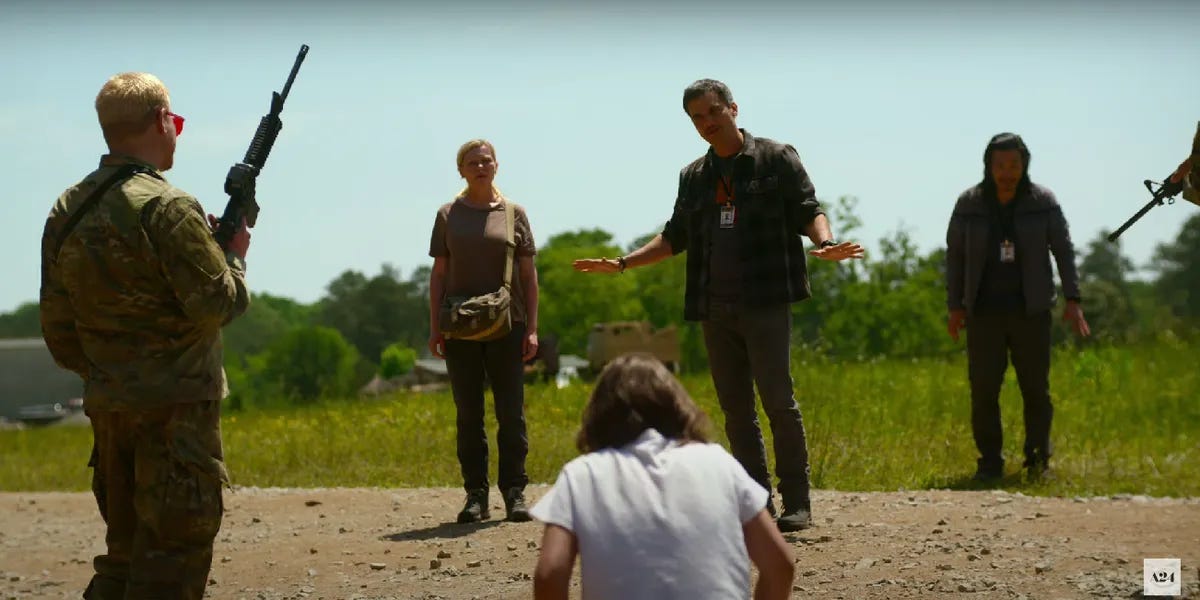The Enlightened Centrism of Civil War
Alex Garland refuses to take sides, or even clarify who the sides are.
Writer/Director Alex Garland has announced his intention to retire from directing. After seeing Civil War, I can see why.
One of A24’s most costly productions at $25 million, the gamble of Civil War could pay off for the reputable distribution and production company with an opening weekend of $25 million, a record for them. It should be a Win across the board: a win for a film brand scaling up their productions to compete in the studio system, a win for a moviegoing public that’s fatigued with the MCU product line and craving a movie event with substance, and it should be a resounding triumph for Alex Garland, the scribe behind 28 Days Later whose directorial career has evolved from the austere auteur behind Ex Machina and Annihilation to a marquee name that’s breaking records and has dominated the conversation.
Yet, prior to the release of his most anticipated feature, Garland announced that he’ll be unceremoniously stepping away from the director's chair because he’s “fallen out of love” with the process. Oh God. I’m no marketing expert or P.R. whiz, but is that how you want to advertise your latest film? There’s an even more distressing quote from this press tour, where Garland spoke about the all-time high divide between Right and Left, which one would assume was the primary inspiration behind Civil War. The sight of Trump Supporters storming the Capitol with the intention of overturning the election and possibly even hanging Trump’s own Vice President, the sight of BLM Protesters being tear-gassed so that Trump could have a photo-op in front of a Church. Is this what Garland spoke about?
No. He just said, rather flatly, that “left and right, just to be clear about it, are ideological arguments about how to run a state. That’s all they are. They are not a right or wrong, in terms of good and bad.” Okay then. He later tried to clarify these comments after the backlash from both sides of the political spectrum, but this soundbite made Civil War polarizing before it was even released. Ironically enough, you could say it’s causing a civil war among film enthusiasts.
Some are applauding Garland’s Spielbergian command of sight and sound, how the thunderous IMAX presentation makes the horrors of war feel immediate and immersive. They commend his commentary of how the media detaches us from the stakes of real conflicts and filters reality. I hate to tell you, but I just think Civil War is detached. Detached in a manner that suggests that the director is falling out of love with the medium over the course of every frame.
It hurts for me to write this and disparage Garland’s latest audacious effort. Though the audacity lies purely in the imagery and nowhere in the substance. It’s odd for me to be fighting in the Anti-Garland Camp because I was on the opposite side of his last A24 collaboration, Men, which was far more polarizing than Civil War. I would dare say that a consensus formed around Men, and ‘twas not in Garland’s favor.
Men immediately turned people off with the title alone, suggesting an unapologetically pro-feminist message that was coded with anti-patriarchal themes. Despite the inevitable backlash he knew it would receive, Garland didn’t flinch and made a film that was sure to agite and possibly infuriate audiences, but also one that would challenge them and force conversation around difficult topics. Even if I started to lose patience with the Cronenbergish ending, I will always applaud him for that.
That’s not the Alex Garland who made Civil War, and I have a very real fear that the backlash from his previous effort got to him and rendered him toothless. Civil War is still an immaculate production for most, although the daytime scenes sometimes appeared oddly murky. I won’t criticize Garland’s technical prowess because I can’t, not really. It offers the goods, I guess. It’s still shocking to see a wartorn and ravaged America and to see our national monuments demolished and violated.
You know what also accomplished this? Independence Day. But Civil War, with its namedropping of recent tragedies like Charlottesville and the way it casually evokes recent events, makes it obvious that Garland was aiming higher than being the next Independence Day. He probably had Apocalypse Now or Children of Men in mind, but the only way I can compare Civil War to those masterpieces would be quite unfavorably, and it only reveals the magnitude of Civil War’s hollowness.
Civil War follows a team of journalists traipsing their way through the East Coast of America, which has been engulfed in Civil War so that they can interview The President of the United States. We do not know how long the titular Civil War has been going on, or what caused it, or a proper understanding of the basic geography of this conflict. A24 released a graphic outlying the territorial factions of this Civil War, which the film itself is thoroughly uninterested in elaborating on. Its sole interest is watching this band of naive journalists on a Quixotic odyssey through this ludicrously conceived warzone, encountering perversions of Americana and vague gestures to MAGA types.
It’s a movie that has something to say but appears paralyzed to say it, that words are caught in Alex Garland’s throat. He uses real footage of law enforcement violently battling protesters, a move Spike Lee pulled with Blackkklansman with poignancy and conviction. I hate to accuse one of our more cerebral directors of this generation, but moves like that only amount to shock value by the end credits.
Keep in mind, this is not a movie review. I’m not dismissing Civil War or trying to imply that it’s unwatchable. It grabs the audience with arresting imagery and has flashes of tension and disaffected humor that give it a pulse. The scene with Jesse Plemmons, which has already become something of a meme since the trailer dropped, is the culmination of everything that Civil War has going for it. It’s suspenseful in a darkly funny, capturing the farce that is fascism. We have to take these goofballs seriously. We have to be afraid of them, of what they’re capable of. They can wear paintball gear or Viking helmets, and they keep us on the edge of their seat with their mania. “What kind of American are you?” is the most pointed Civil War’s agenda gets to any of the real-world tensions that are seemingly tearing the West apart. A shame it’s only one scene and stands in such contrast to the rest of the film’s state of ambivalence.
Without any context for this conflict, without anything other than allusions to our reality, the only thing one can surmise from Civil War is that war, is in fact, bad. It’s nasty, grisly, and ugly. Some would say there are no winners, although *spoiler alert* there’s a pretty damn clear winner by the final frame. Garland’s challenge to the audience is to force them to picture civil war in their backyard when the concept seems so foreign to Modern Americans. That’s something that only happens in Middle Eastern countries, right?
The thing is, our country already had a civil war. It was over slavery. Garland treats the possibility like it’s a hypothetical akin to science fiction. I understand, science-fiction is his forete. Science fiction served him well at deconstructing and analyzing social tensions with 28 Days Later, but the concept of a Civil War a reality that haunts this country and all other democracies. They arise out of many factors, whether they be cultural or economic, but Garland is playing the Tapdance of Centrism by giving us a Civil War that has no cause. If it has no cause, the cause must not matter. Not to Garland, and not to the beleaguered journalists who do not but observe to state of their fallen world and offer no interpretation or analysis.
While watching the street battles in Civil War, I just couldn’t help but think of what the Palestinians are suffering at the hands of the IDF. Watching innocent civilians get dumped into Mass Graves, I couldn’t help but think of the fallen soldiers in the Spanish Civil War who were dumped in Mass Graves, ones that have recently been uncovered. These people did not die for nothing, they did not die out of something petty dispute. Whatever side you take, there are sides and the world does not need some feckless bit of Dystopia Porn to remind them that violence is ugly. But violence is unavoidable if societies do not have the courage to confront issues and more importantly to confront each other in public forums.
It takes a conviction that was probably pummelled out of Garland after the backlash of Men, which earned him eye-rolls from critics and the label of “cuck” from the Red Pillers. Perhaps if he focused in on a specific grievance behind our divide, his grave warning to Western culture would be received with more hostility. So why bother? That, my friend, is the Grift of Enlightened Centrism.
After all, to quote a former president, there are “fine people on both sides.” Not that we get to know the people even involved in the conflict. The only characters not portrayed as ghouls or dullards are the reporters, who for my money are ghouls in the guise of dullards.
Kirsten Dunst plays our lead, and while it’s great to see her, I think her co-star Wagner Moura, formerly Pablo Escobar in Netflix’s Narcos, steals the show as the journalist who borders on willfully naive and gravely divorced from the stakes. The most chilling image, at least the most jolting one, is watching him laugh it up with one of the warring factions as they gun down prisoners. Kirsten Dunst just watches the scene unfold with the same passively disgusted expression that she adorns for the entire runtime. The Civil War apologists are defending this movie as not about Civil Wars but about the state of journalism. An interesting defense as journalists are being blown to bits in Gaza as they report on Israeli War Crimes.
Yes, there could be an attempted meta-narrative about the ways we process conflict, but I don’t buy it. Gen Z has become animated by the images of wartorn countries, not alienated by them. Journalists aren’t just careerists looking for a scoop, they’re detectives unraveling the mysteries of evil. Alex Garland had an opportunity to speak truth to power, or at the very least, satire. But to be proper satire, one needs a coherent grasp of the truth.
When it was announced by A24 that Civil War’s enemy factions would see an alliship between California and Texas, I was prepared for one of the funniest movies in a long time. What a brilliant joke. Hysterical. Surely Civil War was a spoof in guise of an epic, much on the level of “Springtime for Hitler,” the fictitious play from The Producers. It starts off on the right note as The President, a perfectly cast Nick Offerman, nervously rehearses a victory speech in a bumbling manner. Now, I would imagine that this is how Garland practiced for his interviews to promote Civil War, because every passing minute of attempted provocation revealed that this movie wasn’t in on the joke. It was the joke. People clown on Independence Day, and I’m right there with them. But it didn’t pretend to be anything other than a braindead blockbuster with pretty lights and patriotic platitudes. Civil War is Independence Day but thinks it’s Children of Men. So if you want a war film that offers a substantive analysis of our current turmoil, or just a dystopian science-fiction tale that’s carefully thought out the logic and logistics of its universe, then skip Civil War and just watch Alfonso Cuaron’s masterwork instead.









